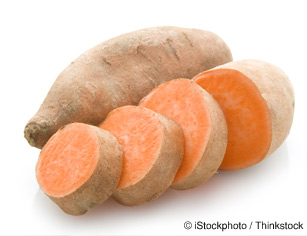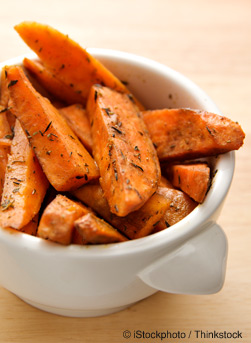What Are Sweet Potatoes Good For?

Sweet Potatoes Supreme
Botanical name: Ipomoea batatas
Cultivation of sweet potatoes, which are native to Peru, dates back to 750 BCE. Discovered by Columbus, sweet potatoes, often (wrongly) called yams, belong to the Convolvulaceae, or morning glory plant family. Yams (from the African word "nyami"), which are from the Dioscoreae family, have only one embryonic seed leaf, while sweet potatoes have two. Another note for consumers: yams are usually more moist.
There are about 400 varieties of sweet potato, some more rare than others, differentiated by their skin and flesh color, ranging from cream, yellow, and orange to pink or purple. Oxidation turns them dark in spots after peeling, so it's best to bake or steam immediately, or place in water until you do.
Baked sweet potatoes are a lovely alternative to plain white, especially with butter, salt, and pepper. Sweet potato chips and fries (cooked in coconut oil) are tasty snacks. Boiling isn't recommended because of potentially lost nutrients.
It's good to know that the health benefits of sweet potatoes may even surpass their reputation as a holiday favorite, having unique attributes not seen in other plant-based foods.
Health Benefits of Sweet Potatoes
The deep orange color is more than just different than white potatoes; it's one of the indications of beta-carotene presence, shown by numerous studies to be especially rich in sweet potatoes. The vitamin A per serving even rivals that of green leafy vegetables (yams only have 3%!), providing 769% of the daily value per serving. In fact, the only food that has more vitamin A is three ounces of beef liver! The 65% daily value of vitamin C and 29% DV of vitamin B6 isn't too bad, either.
Two key antioxidant enzymes in sweet potatoes are copper/zinc superoxide dismutase and catalase. One study showed purple sweet potatoes to have more than three times the antioxidant activity than that of one type of blueberry.
Especially in light of their high sugar content, a surprising fact about sweet potatoes is their ability to help regulate blood sugar, even in type 2 diabetes patients. Research has verified that sweet potato extract can increase blood levels of adiponectin, a protein hormone produced by your fat cells, to regulate the way your body metabolize insulin, and even lower insulin levels when needed.
However, make sure you consume sweet potatoes in moderation, as some varieties are high in fructose. In fact, the American sweet potato has been literally bred for sweetness, with 6.5 grams of sugar per 100 grams.
Sweet Potatoes Nutrition FactsOne cup of baked sweet potatoes (200 grams) |
||
|---|---|---|
|
Amt. Per Serving
|
||
|
Calories |
180 | |
|
Carbohydrates |
41 g | |
|
Sugar |
13 g | |
|
Fiber |
7 g | |
|
Protein |
4 g | |
Studies Done on Sweet Potatoes
Studies show that heat processing methods for sweet potatoes, such as steaming, baking, or boiling as opposed to raw, not only releases beta-carotenes, but also makes them more accessible to the body,1 possibly because heat causes a disruption in the microstructure of the tissue.
Other studies have demonstrated that sweet potato extract has anti-obesity and anti-inflammatory potential, reducing inflammation in brain tissue and nerve tissue throughout the body.2
Anthocyanidins, responsible for the pigmentation of deeply-hued vegetables like purple sweet potatoes, contain flavonoid and antioxidant wound-healing properties. Studies have attributed anthocyanidins for suppressing stomach, colon, lung, and breast cancer cell growth. Because they also prevent platelets from sticking together, they prevent blood clots, which may in turn help fight heart disease.
Other polyphenols in purple sweet potatoes include cyanidins and peonidins, which studies indicate have strong counter effects on cancer cell growth. Interestingly, these anti-cancer compounds are more concentrated in the sweet potato itself than the skin,4 and may also lower the dangers posed by heavy metals and oxygen radicals, including mercury, cadmium, and arsenic.
Research in another study showed both benign and cancerous colorectal tumors to multiply in the presence of substances such as pyridine, (structurally related to benzene and ammonia) and dimethylhydrazine (a rocket propellant), but these toxins were inhibited by introducing purple sweet potato.4 The results "clearly demonstrated" that purple sweet potato has the capacity to reduce colorectal carcinogens.
Sweet Potatoes Healthy Recipes: Grilled Coconut Sweet Potato Kabobs

Ingredients:
- 2 or 3 sweet potatoes, peeled and cut into 1-2 inch pieces
- Unsweetened, flaked coconut
- 1 one-pint container of plain Greek yogurt
- 1 Tbsp. coconut oil
Procedure:
- Pre-heat grill to medium-high. Steam sweet potato chunks in a small amount of water, stovetop, for 10 minutes.
- Allow to cool. Place the sweet potato chunks on wooden or metal skewers, baste them with Greek yogurt, drizzle with coconut oil, and then grill until lightly browned and crispy on the surface (about 4 minutes on each side).
- Roll the entire skewer gently on a plate liberally sprinkled with the coconut flakes. Season with salt if desired. Easy and delectable!
Sweet Potatoes Fun Facts
Sweet potatoes were transported to Spain, probably by Columbus, in about 1500. Several varieties, including purple and red, were cultivated there by the mid-16th century. Other Spanish explorers carried the orange and purple-hued tubers to the Philippines and East Indies, and from there cultivation spread to India, China, and beyond, via Portuguese voyagers.
In 1740s, "sweet" potatoes became known as such in the American colonies to distinguish them from white "Irish" potatoes.
Summary
Don't just serve deliciously honeyed or savory sweet potatoes on holidays; enjoy them regularly in a plethora of ways – sautéed, baked, steamed, or fried – because they're good for you! Antioxidants take the bite out of free radicals roaming throughout your body looking for a place to cause damage, but that's just one of the tremendous health benefits you get from sweet potatoes. Anthocyanidins, which give them deep pigments such as orange and purple, contain flavonoid and antioxidant clotting, wound-healing, and heavy metal cleansing properties.
Sweet potatoes come with super strong beta-carotenes, along with copper/zinc superoxide dismutase and catalase, adiponectin for balancing your insulin, impressive doses of vitamin A, plus good levels of vitamin C and vitamin B6. Studies have proven both orange and purple sweet potatoes to be cancer fighters, but purple sweet potatoes include cyanidins and peonidins for extra protection.
Including three to five grams of (good) fat with every meal significantly increases your beta-carotene uptake from sweet potatoes, easily done by using one tablespoon of extra virgin olive oil.
© Copyright 1997-2013 Dr. Joseph Mercola. All Rights Reserved.